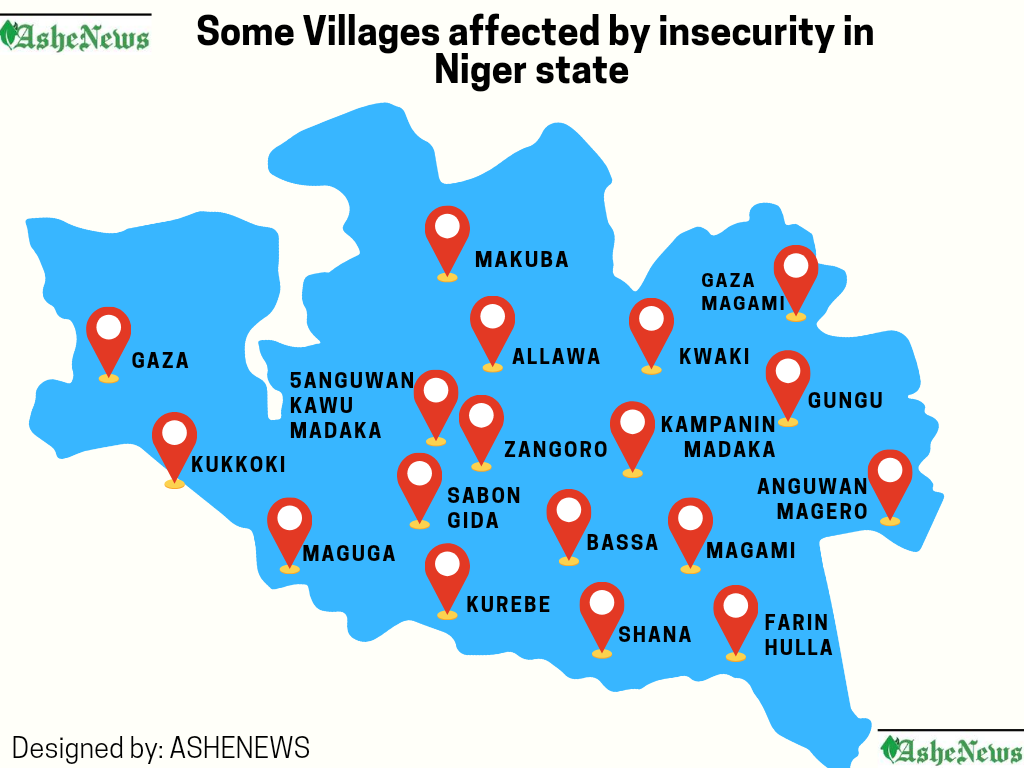Niger East senatorial district has been grappling with a persistent issue of low farm yields for quite a number of years, leaving the indigenous communities facing food shortages, a low supply of farm produce, and dire consequences for the welfare of affected populations.
Farmers, who form the backbone of agricultural activities in the area, have been witnessing a decline in their farm yields.
According to their testimonies, multiple factors contribute to this shortfall, including insecurity, inadequate access to modern plant growth enhancers, a lack of financial assistance, and the prevalence of pests and diseases affecting crops.
“The concurrent attacks by bandits have made most of us flee our homes. Some of us are displaced in the bushes, and some of us are in the IDP camps across the region.
“This has made it increasingly difficult for us to properly utilize our lands to yield in the bumper,” said Bello Magami, a local farmer.
“Furthermore, we lack the resources to afford organic fertilizers and adopt more sustainable farming practices with higher yields as the viability of our land is gradually decreasing,” he said
According to the Nigeria Bureau of Statistics (NBS), Nigeria’s annual inflation rate has risen to 27.3 percent in October 2023, which is the highest since August 2005, and this showed a 0.61 percent point from the 26.72 percent that was recorded in September.
In its Consumer Price Index (October 2023), the NBS stated that, “In October 2023, the headline inflation rate increased to 27.33 percent relative to the September 2023 headline inflation rate, which was 26.72 percent.
Major contributors to the increase in inflation were food and non-alcoholic beverages, housing, water, electricity, gas, and other fuel, clothing and footwear, transport, furnishings, and household equipment and maintenance.
Low farm yields have had a ripple effect from the farmers to the supply chain, impacting marketers and consumers alike.
Marketers are struggling to source sufficient quantities of farm produce to meet the demand, resulting in inflated prices and limited choices for consumers.
“Due to insecurity, we can no longer farm on large hectares; even those that were able to do so cannot go to their farms to properly maintain the plants. This leaves us with a scanty harvest,” said Titus Goni, a farmer in Shiroro local government area.
Mallam Muhammed Sani, a yam marketer, expressed his concern about the declining supply: “The changes in the price of farm produce from the farmers and the transportation cost have made it nearly unaffordable for me to access adequate supply. This, in turn, affects the price we offer consumers.
The dire consequences of banditry activities, which are evident in the Niger East senatorial district, contribute largely to the displacement of people, leading to food insecurity.
In the Internally Displaced Persons (IDPs) Camp, the displaced individuals rely heavily on food aid and government assistance.
The limited agricultural output aggravates their situation, making it challenging for them to access sufficient nutritious meals.
“Food shortages have become a daily struggle for us,” said Fatima Magami, an IDP. “We are desperate for support, and the scarcity of food only adds to our hardships,” she added.
Based on the available data, the displaced persons in most of the IDP camps across Shiroro, Rafi and Munya local governments comprise traumatized villagers from Magami, Gaza Magami, Anguwan Magero, Kampanin Madaka, Anguwan Kawu Madaka, Zangoro, and Bassa.
Others include Makuba, Maguga, Kukkoki, Kurebe, Kwaki, Allawa, Farin Hulla, Gungu, Sabon Gida Gaza, Shana, and several villages in the Munya local government area.

However, the number of IDPs across Shiroro local government area of Niger state has dropped massively in the previous months, according to the current statistics accessed from the Information Officer of Shiroro local government, Mr. Abubakar Abdullahi.
Recognizing the urgency of the issue, the Ministry of Humanitarian Affairs and Poverty Alleviation has initiated measures to address the challenges faced by the affected communities.
The Ministry is working towards collaborating with relevant bodies and stakeholders to implement interventions that will arrest the ongoing crisis.
In an interview with the Information Officer of the Ministry, Mr. Habibu Wushishi, he highlighted the commitment of the government to finding sustainable solutions.
“We are looking forward to synergizing with security chiefs, civil society organizations, and community leaders to completely tame their menace,” he stated. “Financial aid has been provided, and we will still do more by equipping farmers with the necessary skills to improve their farm yields.”
As the authorities and stakeholders continue their efforts to address the lingering quagmire of short farm yields, the affected communities and IDPs implore them to expedite measures that will ensure food security, enhance agricultural productivity, and ultimately improve the welfare of all inhabitants in the eastern part of Niger State and nationwide.


